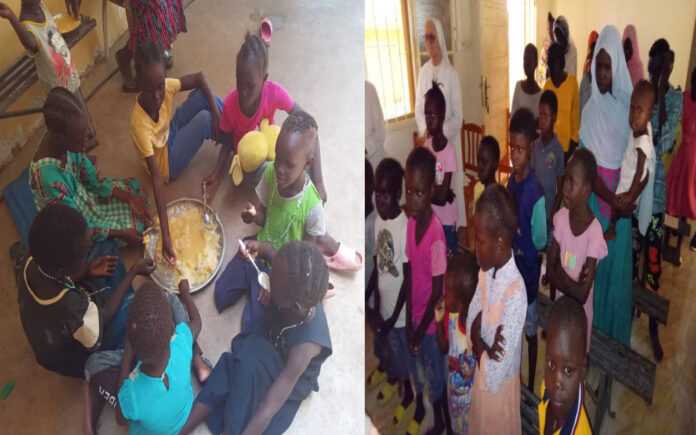Khartoum: Father Jacob Thelekkadan adjusted his belt, now notched tighter, as food supplies dwindled at Dar Mariam mission in Khartoum. The Catholic compound, nestled in the al-Shajara district, has become a refuge for around 80 people—mostly women and children—caught in the crossfire between Sudan’s army and the paramilitary Rapid Support Forces (RSF).
The compound’s main building bears scars of war—its roof damaged by shells, nuns’ quarters set ablaze, and walls marked by stray bullets. Supplies have run so low that desperate measures like boiling tree leaves for meals have become necessary, with many adults skipping meals to stretch what little remains.
In December, a Red Cross effort to rescue the trapped families ended tragically, with two dead and several wounded in an attack blamed on unidentified gunmen. Despite offers from the army to evacuate them permanently, Father Jacob and the nuns have chosen to stay, refusing to leave behind those who rely on their protection.
Since conflict erupted in April last year, Sudan’s capital has been engulfed in violence, with Khartoum, Bahri, and Omdurman becoming battlegrounds. The RSF, occupying strategic sites and high-rise buildings with snipers, faced retaliatory strikes from the army, causing widespread destruction.
Dar Mariam mission emerged as a sanctuary for those who couldn’t afford to flee or had nowhere else to go. Photos shared by Father Jacob depict a scene of devastation—debris-strewn buildings, bullet-riddled walls, and interiors blackened by smoke—a stark contrast to the mission’s role as a haven amidst chaos.

“Our food situation became very bad,” Father Jacob lamented. “We’re all very weak.”
The mission’s residents, primarily Christian refugees from South Sudan and Ethiopia, have set up makeshift tents around the compound’s church, school, and residential areas. When nearby fighting intensifies, they seek shelter within the mission’s concrete walls. Some impoverished Muslim families from Sudan have also sought refuge there.
Attempts to evacuate have been thwarted by the RSF’s blockade, leaving families trapped. Nighttime evacuations across the White Nile are deemed too risky for children, further isolating the mission from potential rescues.
Also Read | Lebanese Farmers Seek Answers on Israel’s White Phosphorus Use
Sudan’s conflict has led to one of the world’s largest internal displacement crises, with nearly 10 million people seeking refuge either within Sudan or abroad, according to the International Organization for Migration. Ethnic violence in Darfur and widespread famine warnings underscore the severity of Sudan’s humanitarian crisis.
Humanitarian efforts are hindered by both warring factions, impeding the delivery of vital aid to civilians. Allegations of using civilians as shields further complicate relief efforts, leaving the mission dependent on sporadic assistance from grassroots organizations.
“We are waiting for evacuation,” Sister Miriam, one of the nuns at Dar Mariam, expressed amidst the ongoing turmoil.
To shield children from the crossfire, Father Jacob and the nuns transformed the mission’s most secure room into a safe haven, encouraging them to play games and use bicycles in the yard to distract them from the violence outside.
Also Read | China Dominates Generative AI Patent Race, UN Report Reveals
In early January, renewed fighting engulfed Dar Mariam, setting rooms in the nuns’ residence ablaze. Food shortages worsened as market closures due to clashes made it nearly impossible to replenish supplies.
Since February, airdropped provisions from nearby military outposts, including sugar and fuel for generators to draw water from wells, have provided brief relief. The army also facilitated a Starlink connection, restoring communication lines for those at the mission.
“We want to leave and tell the world what happened here,” Sister Celestine remarked, reflecting on their ordeal.
As conflict persists, Father Jacob’s recent plea for prayers underscores the ongoing dangers faced by those sheltering at Dar Mariam.



